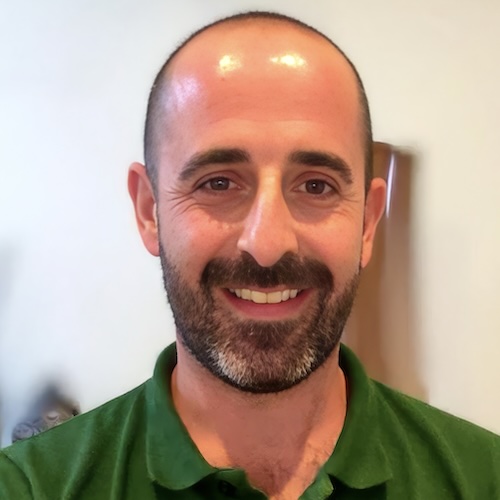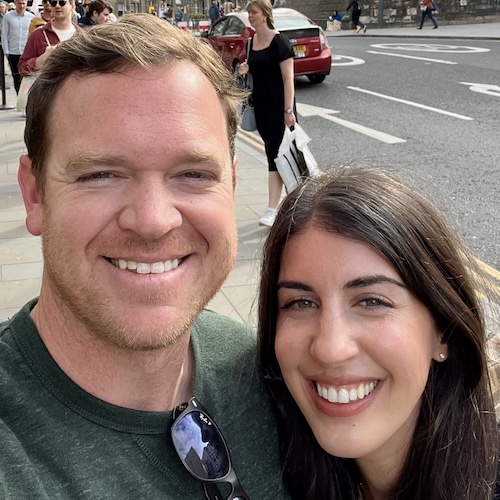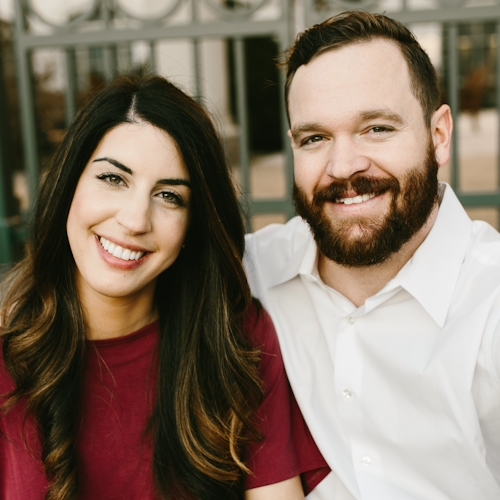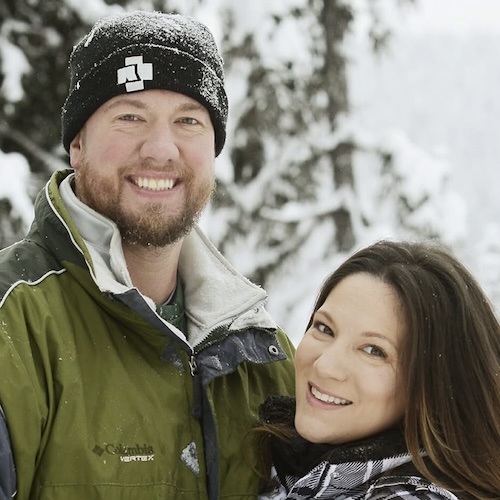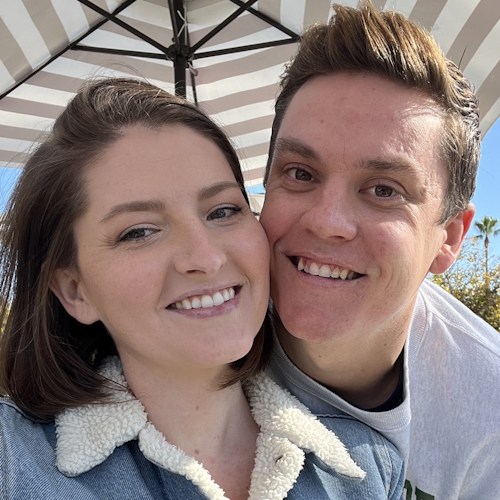Why Showing Up Matters: Nat’s Caregiver Role in His Wife’s Muscle-Invasive Bladder Cancer Story
When Nat’s wife, Ebony, was diagnosed with muscle-invasive bladder cancer, life shifted dramatically for their entire family. As Ebony’s primary bladder cancer caregiver, Nat found himself navigating not only the physical demands of caregiving but also the emotional complexities of supporting a fiercely independent woman through something so life-altering.
Interviewed by: Taylor Scheib
Edited by: Katrina Villareal
He wasn’t just present for her treatments — he became a constant, steady source of reassurance, encouragement, and strength, even when his own heart was breaking. Early signs were subtle, which included frequent bathroom trips and unexplained abdominal bloating. Ebony brushed them off at first, and like many people, she hesitated to push harder for answers.
When the diagnosis finally came, it hit like a punch. Despite medical appointments and proactive efforts, no one expected bladder cancer. Nat remembers the moment clearly, experiencing shock, disbelief, then anger, but he quickly moved into action mode, determined to be there every step of the way.
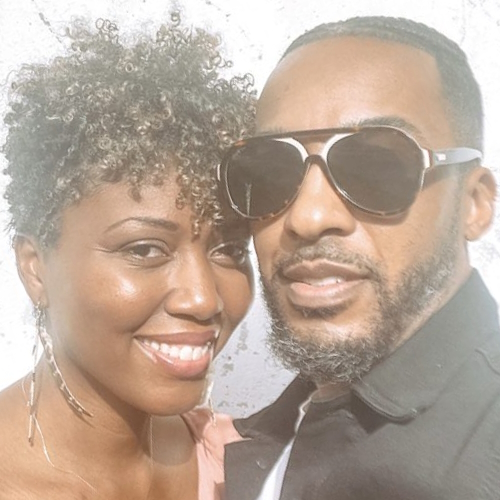
Throughout the experience, Nat stayed grounded. He didn’t try to predict the future or let fear take over. Instead, he focused on “conquering the day,” one at a time. His presence at every appointment spoke volumes. Even when words fell short, just showing up was a lifeline. That’s something every bladder cancer caregiver should know: being there matters more than having the right thing to say.
Navigating stigma was another layer of challenge. Bladder cancer isn’t always widely discussed, and Ebony didn’t fit the typical profile. Nat and Ebony leaned on bladder cancer support groups and online communities but were cautious, as too much information sometimes did more harm than good. Nat often had to remind Ebony to unplug from Google and focus on her story, not someone else’s.
Decisions about treatment — chemo, surgery, and eventually a neobladder — were daunting. But they approached everything as a team, asking questions, doing the research, and advocating for the best care possible. As a muscle-invasive bladder cancer caregiver, Nat learned how critical it is to be informed but not overwhelmed, to stay involved without letting fear drive every choice.
Nat and Ebony also had to help their sons understand what was happening without scaring them. That meant honest, age-appropriate conversations and plenty of reassurance. They were careful to preserve a sense of normalcy while allowing space for emotional reactions.
Now, years later, Ebony is doing well, and their relationship is stronger than ever. They celebrate the small milestones, like the first post-surgery walk or a day without pain. Nat says the experience taught him to cherish every moment and let go of the small stuff. He encourages other caregivers to do the same: stay present, speak love often, and make space for joy, even amid hardship.
- Name:
- Ebony G.
- Diagnosis:
- Muscle-Invasive Bladder Cancer
- Staging:
- Stage N2
- Symptoms:
- Microscopic amount of blood in the urine, which increased to a visible amount of blood
- Pain when urinating
- Weight gain in the midsection
- Treatments:
- Chemotherapy
- Surgeries: removal of the bladder & bladder reconstruction (neobladder)
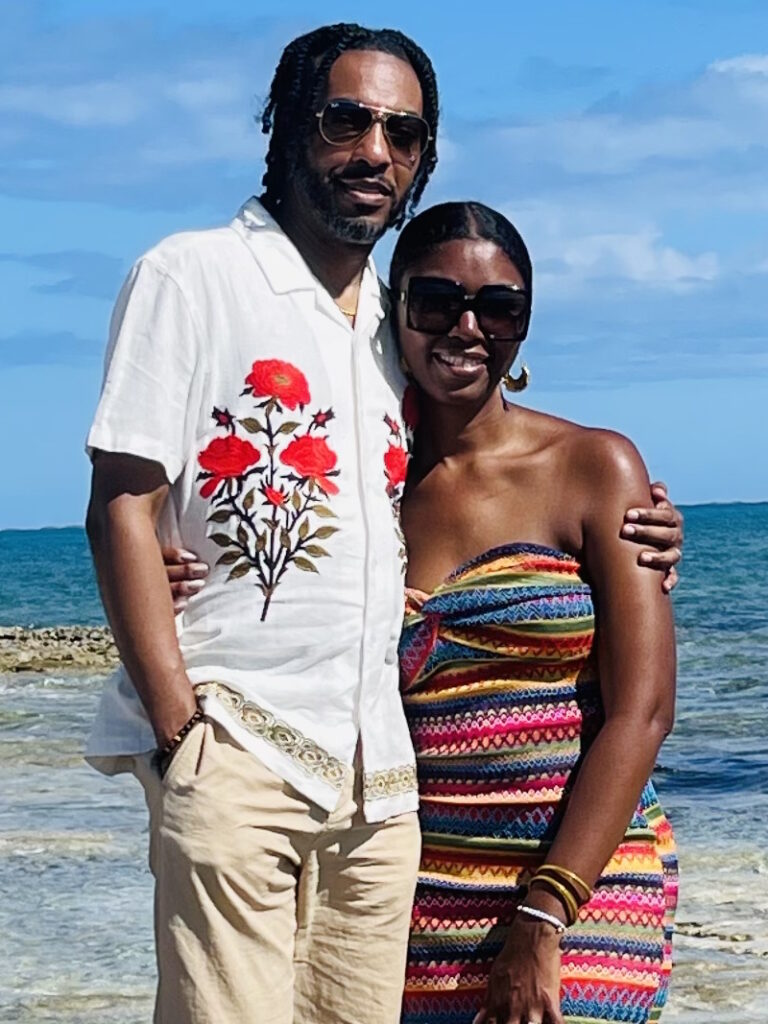

Thank you to Johnson & Johnson for supporting our independent patient education content. The Patient Story retains full editorial control.
This interview has been edited for clarity and length. This is not medical advice. Please consult with your healthcare provider to make treatment decisions.
- Introduction
- How Ebony’s Muscle-Invasive Bladder Cancer Symptoms Started
- Getting to the Diagnosis was Frustrating
- How I Supported Ebony in That Year and a Half to Diagnosis
- The Moment Everything Changed
- How We Learned More About Bladder Cancer
- Discussing the Treatment Plan
- How We Continued to Communicate
- Looking Back at Ebony’s Story with The Patient Story
- Where We Are at With Survivorship
- How We Told Our Sons
- How I Was Taking Care of Myself During That Time
- What Changed in Our Relationship
- What I Want Caregivers/Partners to Know
- My Message of Hope
She never lost her beauty. She even became more beautiful after having experienced the ashes of her life.
Introduction
My name is Nat. I’m Ebony’s husband. My wife was diagnosed with muscle-invasive bladder cancer and I was her caregiver during that time. I’m not her caregiver now, but I still provide that support because it is needed even after recovery. I’m a father of three boys and a dedicated husband.
She would probably say that I’m an easygoing person. I don’t go from 0 to 100 easily. She would probably say I have a sense of humor. I’m definitely a jokester. I love to have fun. She’d describe me as pretty easygoing and laid back.
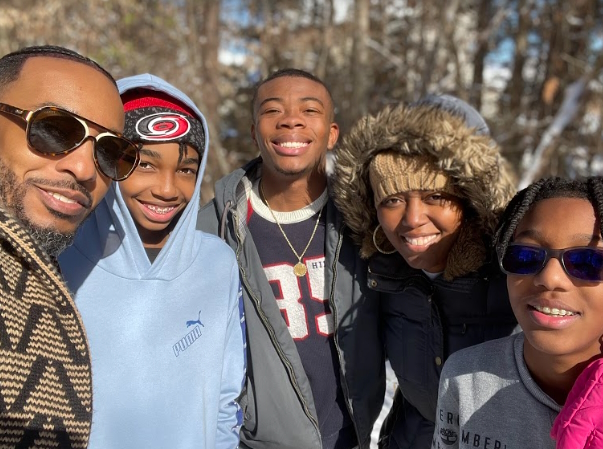
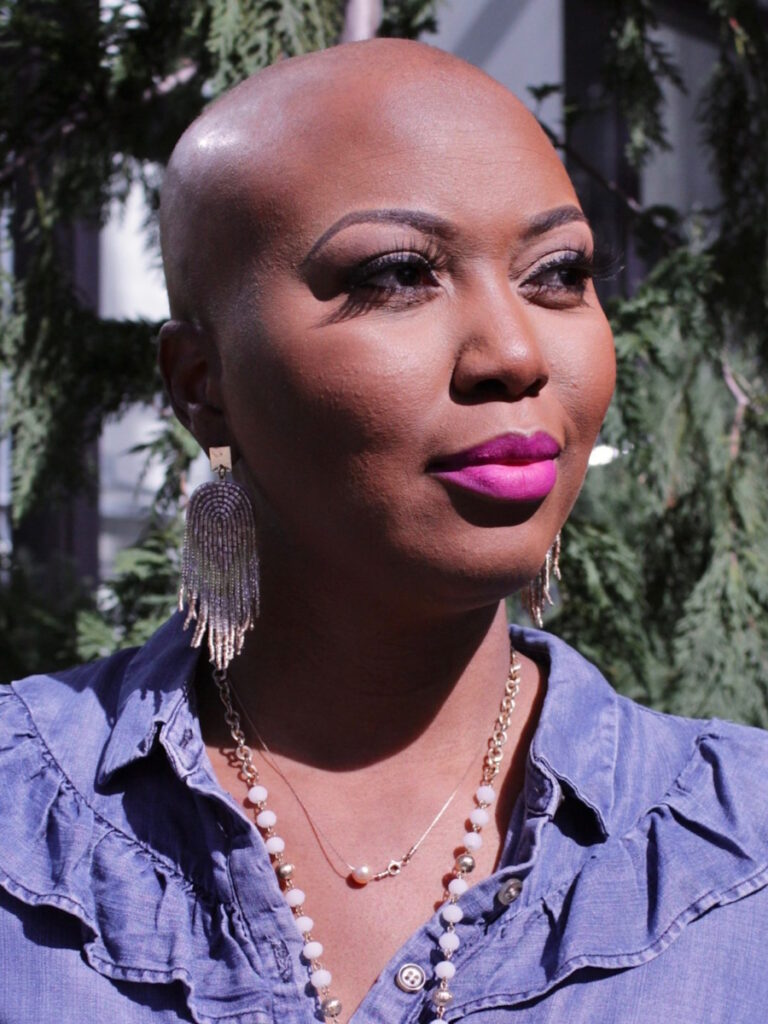
Ebony is a champion. Being there beside her and seeing everything that she had to go through, overcoming the internal challenges of the disease, as well as the external evidence of the disease, which played a big part emotionally and mentally.
She loves her hair and she knew that I loved her hair, so one of her biggest first concerns — and it may sound vain —was losing her hair. I know that played a big part in her daily walk through the cancer experience. She’s always had her hair. Some people don’t care about hair like that, but she did. I knew that was a big challenge for her.
She’s a very independent person, so having to rely on someone to help her do things that she used to do on her own was a big challenge. There were times when she was in the hospital and her heart rate was out of control, but she still needed to walk. She’s a determined individual as well. She could be stubborn, but stubbornness can work to your advantage, too.
In this battle, she was definitely stubborn. She was not going to lie there and die, and not do what needed to be done to become better. When I see her, I see her as a champion, a warrior, someone who overcame, and a good, stubborn person. I see all of those things.
She never lost her beauty. She even became more beautiful after having experienced the ashes of her life. She grew into something different and better.
She started going to the restroom frequently… My antenna started going up a little bit, but I still did not think it was cancer.
How Ebony’s Muscle-Invasive Bladder Cancer Symptoms Started
Initially, she didn’t share with me the symptoms that she was experiencing. Like many of us, when we experience something that isn’t such a huge red flag or shocks us into getting checked, we don’t move, so that’s probably why she didn’t initially. If she did, it was probably very casually done, so it wasn’t alarming.
As time went on, I recall her beginning to share more of her gaining weight in her stomach, which wasn’t an area where she gained weight.
I’m very observant, so I noticed she started going to the restroom frequently. As soon as she came home, she would go to the bathroom immediately. My father had prostate cancer and I saw the frequency and urgency that which he would have to go. My antenna started going up a little bit, but I still did not think it was cancer.
She said, “I’m going to go to the doctor because something is not right. I don’t gain weight here. I frequently have to go to the bathroom.”
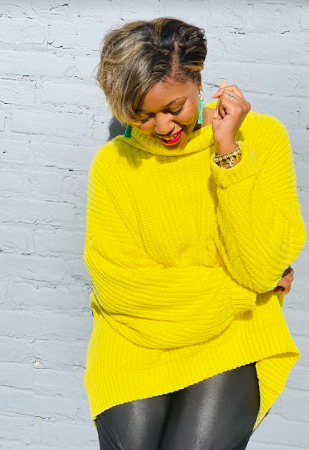
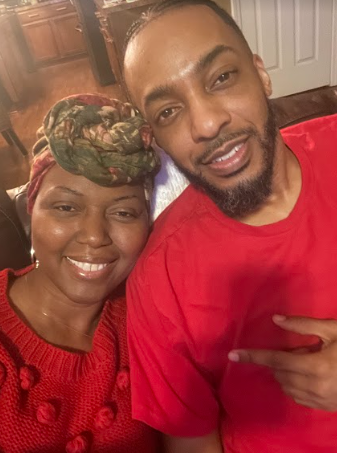
Getting to the Diagnosis was Frustrating
It was frustrating for somebody to tell you that nothing is wrong when you know that something is wrong. I can’t diagnose myself. I can’t open my body up to find what’s going on, but I know that something’s going on inside.
When she went to the doctor, she called me and said, “They’re saying it’s just normal. This could just happen with age or being a mother.” You go on with your day because you want to lean into what the medical professionals are telling you. You want to believe that.
The process of getting the diagnosis was a challenge. Then, to get the muscle-invasive bladder cancer diagnosis, suddenly, everything is zoom zoom zoom. As you’re thinking about what’s to come, you’re thinking about what happened.
How did we get here? We checked the boxes. She was going to the doctor. She was seeing the urologist. She was going to the gynecologist. She was doing everything right, yet here we are.
To worry is to have already given an end to a beginning that has never started.
How I Supported Ebony in That Year and a Half to Diagnosis
I try not to think so much ahead. I’m not a worrier, but it’s not because I’m such a strong person. To worry is to have already given an end to a beginning that has never started. I know that if I go into that headspace, then it’s going to cause stress and spill over from that.
I’d say, “You’re good. Everything’s fine. It’s going to work out.” I didn’t have a medical answer, so I could not speak to that. I just had a faith answer that it was all going to work out. You were going to be fine. It wasn’t going to be that bad.
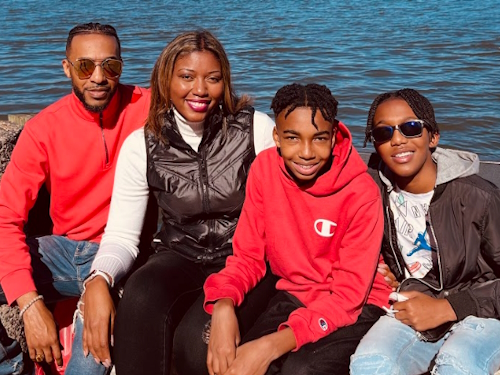
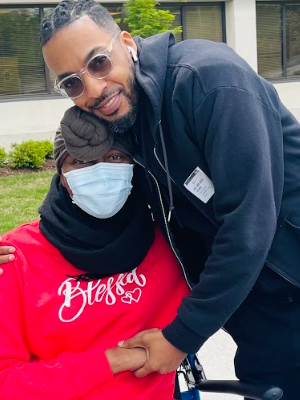
The Moment Everything Changed
When he uttered those words, I could not believe it. I was in a state of disbelief. I looked over at Ebony and instantly saw her eyes. I asked the typical questions: What are we looking at? What’s the next step? What do we need to do? Where do we go from here? How bad is it? You think about all of those things very quickly.
Then I felt a sense of anger because she’s been getting checked, and now this is what they tell us. The doctor just blurted it out.
Ebony was crying, walking out of the doctor’s office. It seemed like the world stood still because you’re trying to process everything. It was not until we pulled into our driveway and I parked the car that I began to cry.
Going through the cancer experience and the healing journey, you have to be careful of the environment that you keep and what you take in.
Nobody wants to hear those words. It was already a delicate time for me. My father had passed away in 2020 and 30 days before him, my older sister had passed. My heart was delicate.
I know I said earlier that I had faith answers for things, but I’m not the individual who does not understand. I’m human and I have human thoughts and emotions. When you hear the word cancer, you automatically think death sentence.
You automatically think, “How much time do I have?” That’s where your mind goes when you’ve had people who have passed away from cancer. After I got over that moment, it was, “This is what we have to do. What’s the schedule? Here we go.” It was time to do that. Now it’s time to compartmentalize because we have things to do to kick this cancer’s behind.
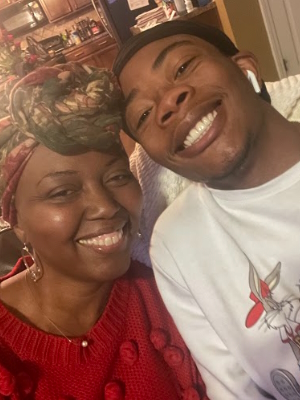

How We Learned More About Bladder Cancer
Bladder cancer was unique to us. We didn’t know anybody to call up and ask. She didn’t fit the mold of what they said a bladder cancer patient should look like, so we didn’t know where to go or who to ask.
My wife is a researcher. She was going to Google. The medical practice gave a manual of support material. The resources they gave her were helpful.
There were support groups that we didn’t even know existed. I found a support group on Facebook that we joined. But because it’s the Internet, you have to be very careful. Going through the cancer experience and the healing journey, you have to be careful of the environment that you keep and what you take in.
You have to be careful what you read and what you process because some people will quickly make it a death sentence. Some people will share with you how they had a friend who had the same sickness and died within two years. It’s not their intent to hurt you, harm you, or make you afraid. Now, because that’s what you see, that’s what you accept, so we had to be careful of that.
There weren’t a lot of options and we didn’t have time to decide what we were going to do.
I had to tell her to put her phone away and say, “Don’t read that today. I don’t need you scrolling through the comments. That may be their reality, but that doesn’t mean that it has to be your reality.”
She’s a very smart person. She’s a chemical engineer, but I have to tell her to stop Googling, “You’re not a doctor, so you may not understand the verbiage that they’re using. It causes extra stress on you that you don’t need for your healing process.” You don’t want to walk in ignorant concerning your diagnosis or what the physicians have told you, but you still have to be careful.

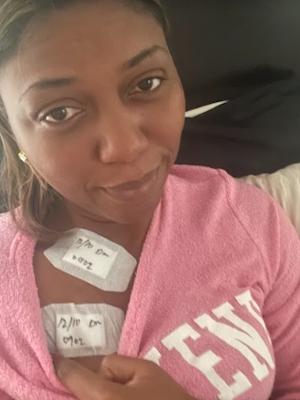
Discussing the Treatment Plan
The options were chemotherapy and surgery. When we got the diagnosis, he said, “It’s very aggressive. We have to start now.” There weren’t a lot of options and we didn’t have time to decide what we were going to do. It was this or that.
She underwent chemotherapy and surgery. There were more options with the type of surgery than for the treatment plan per se. You can get the neobladder that she has or have the bag attached for life, which she definitely did not want. Being in her mid-40s, she was still in her prime. She didn’t want the bag.
I give the team kudos. They were phenomenal. They never made you feel like a burden. They were very empathetic and professional. It made the decision to go with the neobladder, the chemotherapy, and the surgery very easy.
My first concern was, “How does your body function without a bladder?” When I was a kid, all the way up through a portion of high school, I wanted to be a doctor. This was interesting. He’s explaining what it will look like. I’m thinking, “No bladder. That’s not pretty. We need a bladder. You have to have one. How does this happen?”
If you want to support someone as a caregiver, your presence matters.
Then he talked about creating a bladder out of your intestines. I asked him, “Can you not do a bladder transplant? You can transplant hearts, lungs, and kidneys. Can’t you transplant a bladder?” He said, “We’re not there yet, but this is the next best option.”
We researched and were ready to go with it. You’re nervous about it, of course, because if he’s not the only one, he’s one of the very few who specializes in neobladders. I thought it was amazing, but at the same time, it was pretty risky. I was between impressed and scared.
Ebony was pretty calm, but because I know her, I knew she was nervous. She had her questions ready. I don’t think we went into an appointment where she did not have her questions ready. She had the research that she had done on different options. She was nervous, but she never cried. She wanted to get the facts. Whatever she needed to do to survive, she was ready to do that.
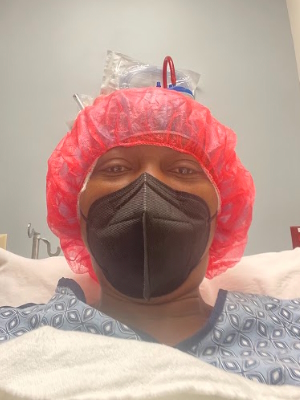
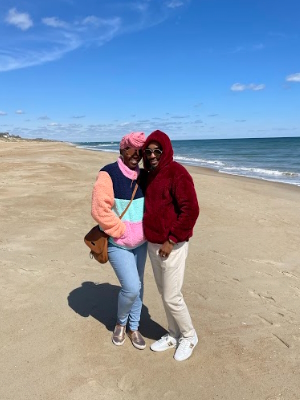
How We Continued to Communicate
It wasn’t hard because you have a big elephant in the room that you cannot ignore. You have to talk about it. You have appointments almost five days a week. You may have three appointments in one day. You have to talk about it because it’s not just the two of you. We have children. We have careers. There’s a lot of communication that has to be done for things to keep moving.
As soon as she was notified of an appointment, she would automatically send it to me so I could put it on my calendar. Everything would be scheduled that way. There wasn’t an appointment that she went to that I did not go to, which was very important.
If you want to support someone as a caregiver, your presence matters. Your words may not always matter, but your presence matters, and that was a way of communicating through this experience. Even today, that’s our way of communication.
If you conquer the day, you’ll be okay, and that’s what we continue to do.
Looking Back at Ebony’s Story with The Patient Story
I remember the headspace that she was in. I told her, “You don’t have to worry about that,” and she started saying, “But…” “There are no buts. I’m not going anywhere. You don’t have to worry about that. I’m going to be here. Let that be the least of your concerns.”
Sometimes, she can be stubborn. Here is where you have to watch what you read. She would say, “This person said this,” and I’d tell her, “I’m not that person. You know how I feel about being compared to anybody. I’m not them and we’re not going there, so let’s move on.”
What’s interesting is I didn’t even think about it. Even when we were talking to the nurse and the nurse brought that up, I was not thinking about that. We’ve been together almost 20 years. If you cannot control yourself in moments like this, you have a bigger problem in your marriage.
I even saw some of the comments in her interview where wives were saying their husbands left. My mind did not go there. It doesn’t mean that you are less of a man; that means you’re more of a man because you can now place the need for healing of your spouse over the need for a few moments of pleasure.
You’re trying to have a lifetime of pleasure. You’re trying to have more pleasure in your life with the person you say you love. Surely, I can put that on the back burner and focus on my spouse getting back to a place of wholeness because right now, she’s experiencing some brokenness. That’s where my mind was.
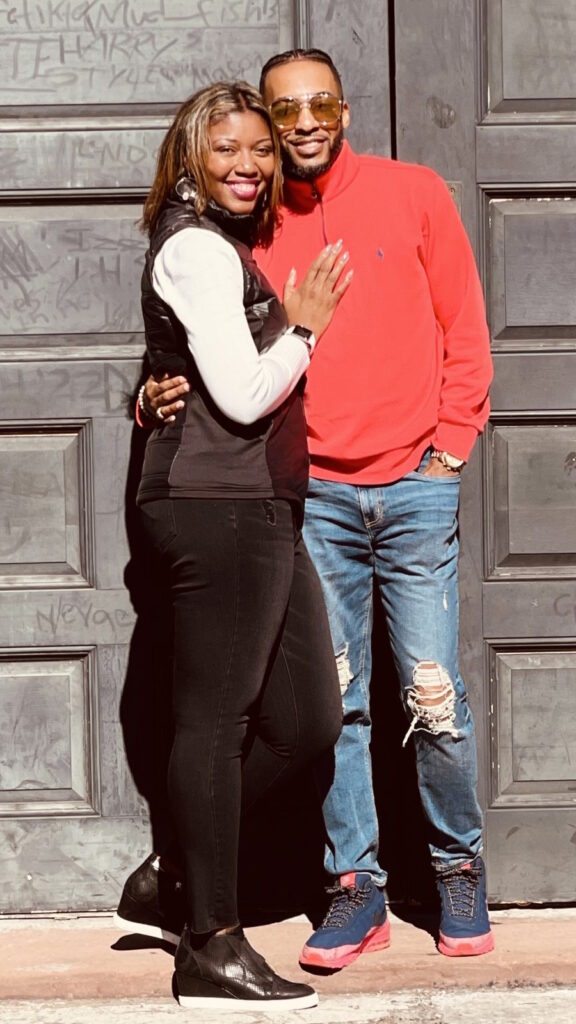
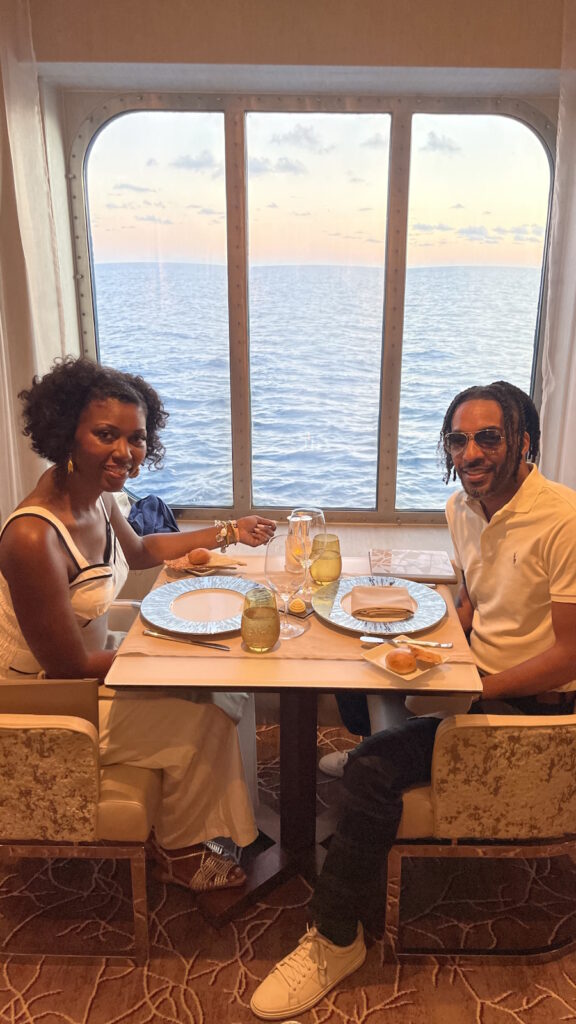
Where We Are at With Survivorship
You would not even know that anything happened. We celebrate the anniversaries, if you will, of that experience because it helps you appreciate where you are.
One of the things that I did right before her surgery was to take her and the family to the beach. She loves the beach and so do I. Being a travel business owner, I researched where we could go. We went to the beach and had an amazing time. I knew it would be a while before we could go anywhere and I knew she was very worried.
We were approaching a surgery that was about to change her life forever. I wanted to do that for her. We continuously celebrate the milestones — the day when she was in the hospital, the time when she couldn’t walk by herself — and that helps that wholeness be there.
Physically, I know she knows and probably thinks within herself that there’s still something different. Her body was not designed this way. She has to self-catheterize. But the wholeness of her emotions and her mental space is what it is. Even when she was concerned about her hair, her hair grew back better than it was before she lost it.
My thing for her was to conquer the day. If you conquer the day, you’ll be okay, and that’s what we continue to do.
The outpouring of support, love, prayers, and gifts was unreal. I believe that made an impression and an impact on our sons to see that we were not in this by ourselves.
How We Told Our Sons
Talk about communication. That was a big piece of communication because you are concerned with how you’re going to tell your children something that they should know without scaring them. Ebony said, “Nat, you tell them because you are good at that. I will probably start crying, but you know how to communicate and bring some assurance to them.”
We brought them all together on the couch. I told them what she had been diagnosed with, what she’s going to experience, and the changes that they’re going to see, such as her hair. But I told them she’s going to be fine. Ebony and I did our very best to make every day as normal as it could be.
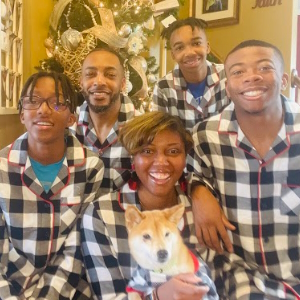
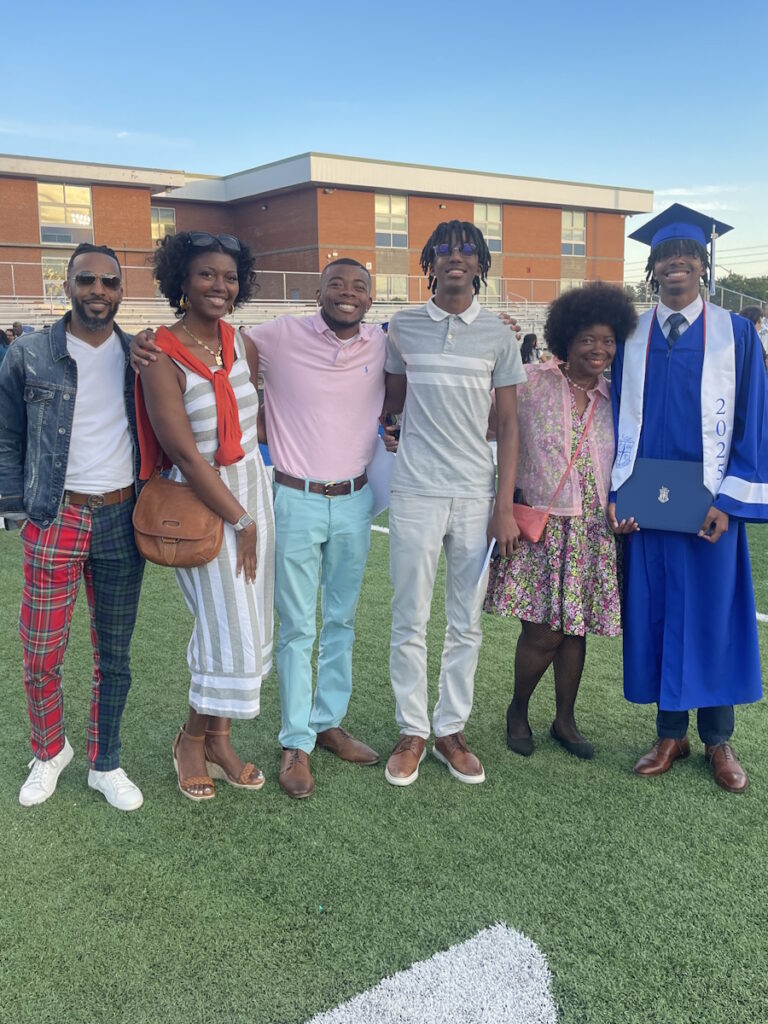
The boys’ demeanor is like mine. They’re not going to worry. After we told them, they went on about their day. Sometimes, she would wonder if they’re worrying because teens have a way of not expressing themselves in front of you, but it comes out through other channels.
We think it affected our middle son as far as his studies. We met with his counselor as his grades dropped during that period and we told them what was going on during that time. We needed to communicate with our children and be as prepared as we could for any questions that they had. I told them if they had any questions or felt any type of way, they could ask and talk to me about anything.
The outpouring of support, love, prayers, and gifts was unreal. I believe that made an impression and an impact on our sons to see that we were not in this by ourselves. We had our parents or close friends come and look after them when we couldn’t be here or running around a lot. That’s how we navigated with our sons.
One of our good friends organized a meal train. People were dropping off food for dinner. When she was having chemo, I was at the hospital with her. They were even bringing food for me to the hospital. It was a breath of fresh air. Humanity may not be as bad.
You look at life through a different lens.
How I Was Taking Care of Myself During That Time
Honestly, I don’t think I did anything different. I had to be present and positive. I did have a few moments, but when I did, it was never in front of her or the children. Maybe because I was present, doing what I should do, so I didn’t feel like I needed to do anything extra to take care of myself.
People asked me, “Are you okay?” The wife of a good friend of mine, who was also my pastor back home, was going through cancer at the same time, so he and I would communicate. I remember calling to tell him the news once we made it public. When I shared it with him, we almost had the same story, just different types of cancers.
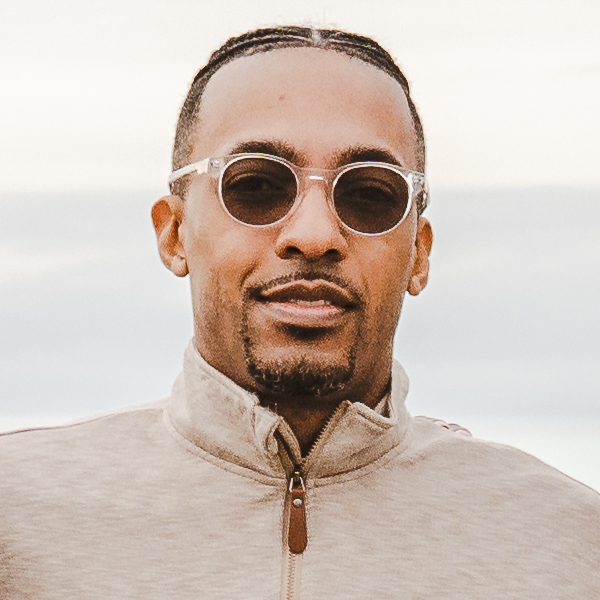
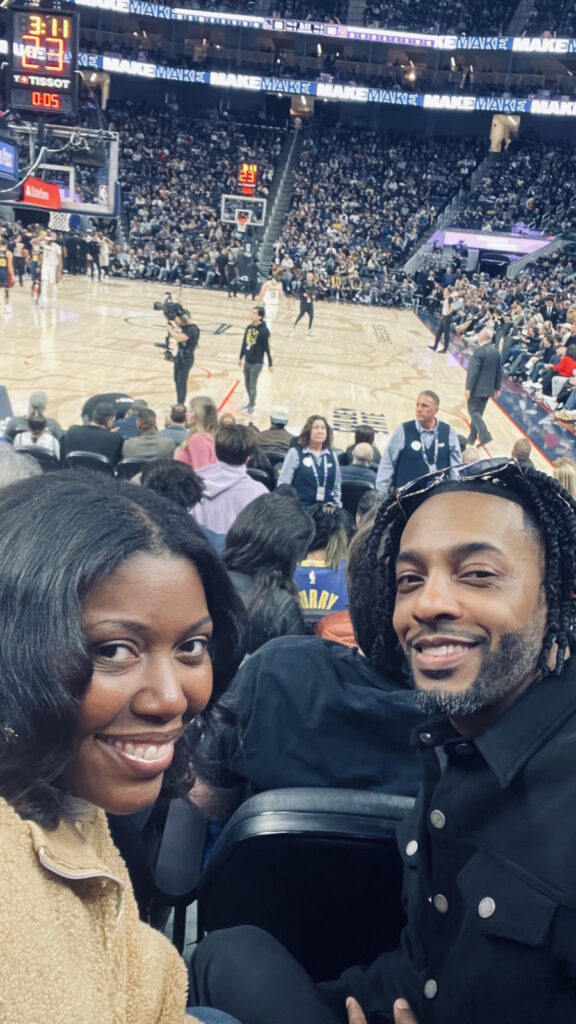
What Changed in Our Relationship
We enjoy more moments together and life in general. You look at life through a different lens. You don’t start majoring in minor stuff. There’s a saying about protecting your peace. You do adopt that. I am not about to deal with drama and this, that, and the other. I’m about to enjoy my life because you see how quickly life can change.
Just because she went through cancer doesn’t mean that we never disagree. It doesn’t mean that we don’t have arguments. It doesn’t mean that she doesn’t get upset with me and I don’t get upset with her. What it has done is make us not sit there and be angry forever, which I never did anyway. We can’t be doing this. It shifts and changes.
Every loss should make you appreciate the game. Every challenge should make you appreciate overcoming. Every day is a literal blessing to be alive. I tell people that the last four years of my life are one of the hardest periods, which included the losses and Ebony getting diagnosed with cancer. It shifts your thinking.
We now live in a space of living. She loves flowers. If you want to go outside and pick hydrangeas, go ahead and do that. Who cares? Nobody cares. If you want to roll around and frolic in the grass, who cares? As long as you are enjoying the time that you have.
For my birthday, she took me to San Francisco to watch a Golden State Warriors game versus the Lakers. I’m not a Lakers fan, but she took me there. It was amazing. It all speaks to enjoying the moment and enjoying life. That’s what I tell everybody. While you have the time and the opportunity, enjoy life.
I’m a person of faith, so I pray… It will get hard and you want to be there for that person in the best way that you can.
What I Want Caregivers/Partners to Know
Be present and be supportive. Be informed because it’s not a cancer that, from what I’ve seen, has a lot of information out about it. It’s becoming more discussed now than it was a few years ago, but do your best to stay informed.
As a caregiver, be present and remain positive. You’re not living in a space of untruth. Yes, this is your truth. This is the reality, but you have to become selfless as a caregiver. You have to assure that person that you are there for them. No matter how unattractive they may feel they are, they are the most beautiful thing that has ever walked this earth.
When Ebony came out of surgery, she was swollen. Nobody told us she was going to be like that. As I walked in, she had come to and was somewhat alert. She knew it was me. I was taken aback, but I couldn’t show that. You have to become selfless.
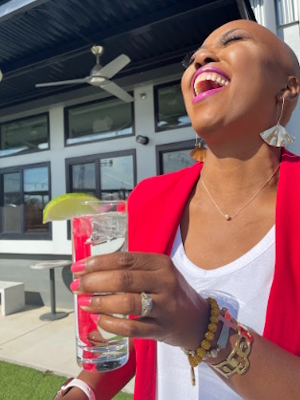
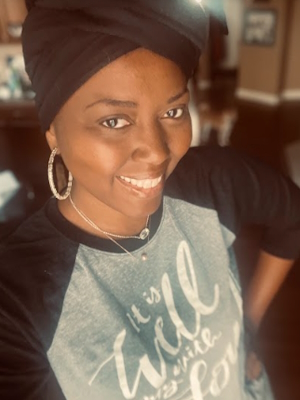
I’m a person of faith, so I pray and that is one thing I would definitely say to do. It will get hard and you want to be there for that person in the best way that you can. There were times when she was in the hospital and I couldn’t say anything. All I could do was be there and hold her hand. That was it.
There were times when she was in pain, moaning and groaning throughout the night. She doesn’t even remember that, but I couldn’t do anything. Nothing. That’s how you realize how little we are, when you cannot control the pain or the situation. It was the presence that contributed to her wholeness.
To anyone who is a caregiver to someone with bladder cancer, be a reassuring individual and a force in their life. Things may change, but let them know that you’re not going anywhere and they’re going to be all right. Let them know you’re going to live life to the fullest and conquer the day.
I believe God is always there, even in those moments of fear, doubt, and questioning. You’re never alone.
My Message of Hope
I know that my presence was there with her. I was not the one with cancer. Your friends can love on you, call you, be supportive, and be there for you, but you can still sit there and think, “I’m the only one. They don’t have what I have. They haven’t been diagnosed with what I have. They have a full bladder. I have one that’s been created out of my intestines.”
You may feel alone, even in a crowd. However, you’ve got to know that you’re never alone. There’s somebody who is going through the exact same thing as you or even worse. There were periods when she discovered somebody else who had bladder cancer, but their story was not turning out the way hers was. It made her and me even more appreciative and grateful for it being better than what it could have been.
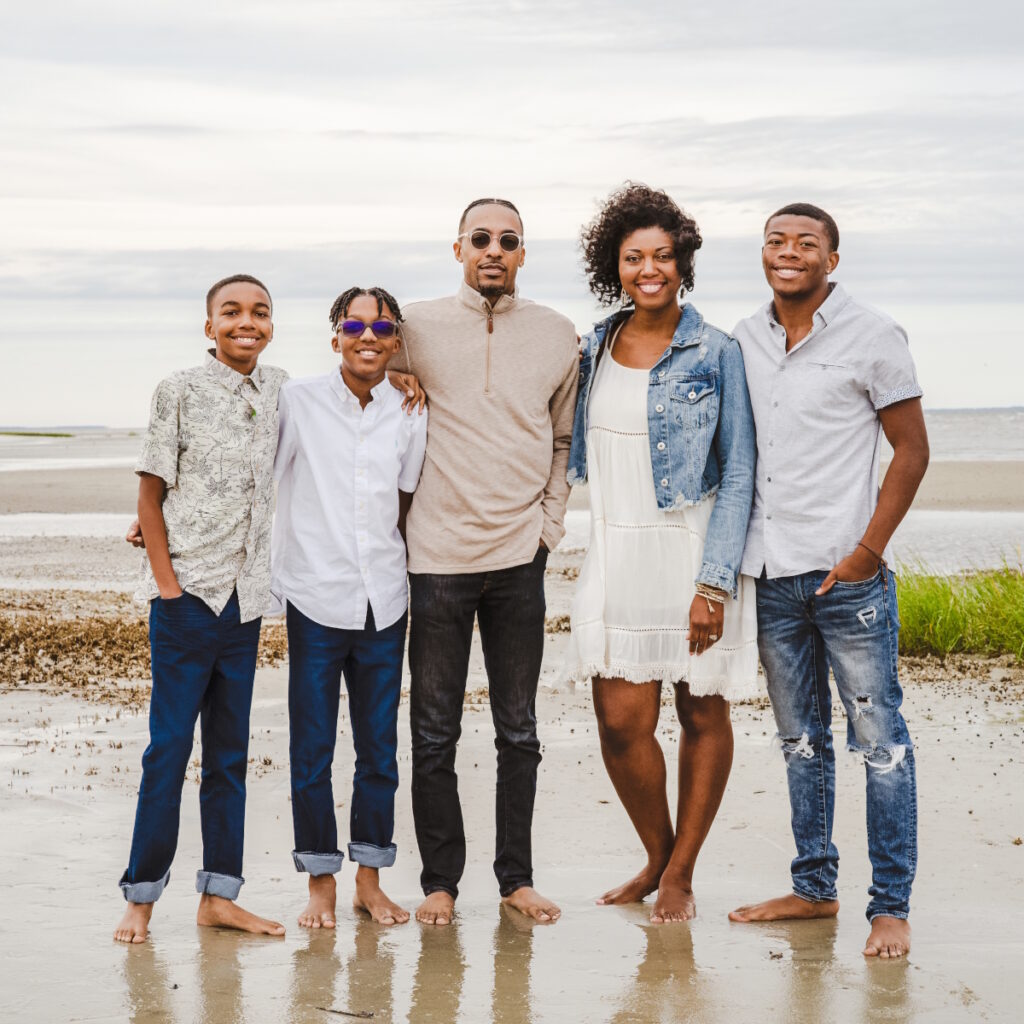
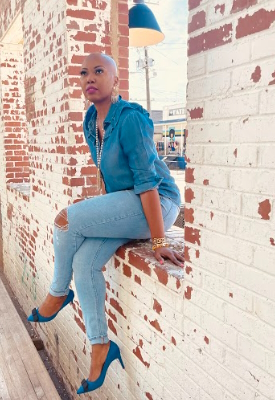
I believe God is always there, even in those moments of fear, doubt, and questioning. You’re never alone. This may be a stretch for some people, but lean into your peace. Conquering the day is what I told her every day of chemo because she had to lean into that. That brought peace not only to her but to me.
None of us knew what the outcome would be. We hoped for it and prayed for it to be a certain way, but we didn’t know. Guess what? If I’m going to go through this, I can’t go through it spinning out of control. I don’t know what’s going to happen and I can’t put death as my today. We’re just going to conquer this day, this moment.
That’s my message of hope to anyone going through the situation. Conquer the day and you will find out that you’re stronger than you thought you were. There’s a little angel somewhere rooting for you, pushing for you, and clapping their hands like our little son did. He was sitting at the table, then he looked and started clapping because he saw his mom walk with me for the first time without her walker. There’s always an angel somewhere.

Inspired by Nat's story?
Share your story, too!

Thank you to Johnson & Johnson for supporting our independent patient education content. The Patient Story retains full editorial control.
Related Stories
More Caregiver Stories
David Garrigues Ronda, Spouse of Laurent Gemenick, Bladder Cancer Patient
“Talk to family, talk to friends. Ask for help. Don't be alone. And above all, don’t miss any doctor's appointments.”
...
Lung Cancer Caregiver Series Episode 2: Stephen and Emily Huff's Candid Conversation
"We talked, and I remember saying, "What if we have kids and what if I die?" And you were like, "What if you live?"
...
Emily Huff., Spouse of Stephen, Lung Cancer Patient
“Emily's the reason why I’m alive today. The treatments have kept the cancer at bay, but she's the one who’s kept me living, breathing, and enjoying life.”
...
Blair D., Spouse of Brain Cancer Patient
“Find other people who are going through the same thing you are. This journey is very isolating and very lonely.”
...
Nat G., Spouse of Bladder Cancer Patient
“You have to become selfless as a caregiver. You have to assure that person that you are there for them.”
...
Kyle Appleford, Spouse of Lung Cancer Patient (Metastatic) with No History of Smoking
“Ask for help. Don’t be too prideful to accept the help. I wouldn’t be here without all the support from family and friends.”
...
